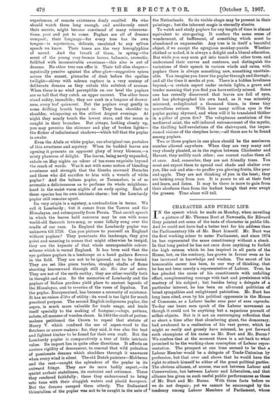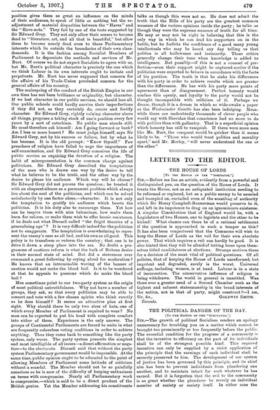CHARACTER AND PUBLIC LIFE.
IN the speech which he made on Monday, when unveiling a picture of Mr. Thomas Burt at Newcastle, Sir Edward Grey pointed out some of the tests of character in public life. And he could not have had a better text for his address than the Parliamentary life of• Mr. Burt himself. Mr. Burt was the first working miner to enter Parliament, and since 1874 he has represented the same constituency without a check. In that long period he has not once done anything to forfeit the high esteem which he has inspired in all parts of the House, hut, on the contrary, has grown in favour even as he has increased in knowledge and wisdom. The secret of his honourable career has been, to our way of thinking, that he has not been merely a representative of Labour. True, he has pleaded the cause of his constituents with unfailing effect, complementing courage with tact and persistence with mastery of his subject; but besides being a delegate of a particular interest, he has been an all-round politician of broad sympathies and enlightened patriotism. Mr. Burt has long been cited, even by his political opponents in the House of Commons, as a Labour leader sans peur et sans reproche. To-day one hears men speak of the Labour movement as though it could not be anything but a rapacious pursuit of selfish objects. But is it not an encouraging reflection that so short a time after that slumbering giant, the democracy, had awakened to a realisation of his vast power, which he might so easily and grossly have misused, he put forward such champions of his cause as Mr. Burt and Mr. Burns ? We confess that at the moment there is a set-back to what promised to be the working-class conception of Labour repre- sentation. The prospect at one time seemed to be that a Labour Member would be a delegate of Trade-Unionism by profession, but that over and above that he would have the right to attach himself to either of the great political parties. The obvious alliance, of course, was not between Labour and Conservatism, but between Labour and Liberalism, and that alliance has given us such useful public performances as those of Mr. Burt and Mr. Burns. With these facts before us we do not despair; yet we cannot be encouraged by the tendency among Labour Members of Parliament, whose
position gives them so great an influence on the minds of their audiences, to speak of little or nothing but the re- adjustment of material disparities between the "Haves" and the " Have-nots." They fail by one of the tests suggested by Sir Edward Grey. They not only allow their senses to become dead to " literature, art, and all that is beautiful," but allow them to become nearly dead even to those Parliamentary interests which lie outside the boundaries of their own class- demands. It is the fashion among Socialist Members of Parliament to depreciate the methods and services of Mr. Burt. • Of course we do not expect Socialists to agree with us, but Mr. Burt's political character is precisely the one which we think Labour in its own interests ought to imitate and perpetuate. Mr. Burt has never supposed that concern for the affairs of his Trade-Union precluded concern for the general affairs of his country.
The mainspring of the conduct of the British Empire in our own time has not been brilliance or originality, but character. If we lost character in our public services, we should lose all. Our public schools could hardly survive their imperfections if they did not, as they certainly do, create and fortify character. Sir Edward Grey, rightly valuing character above all things, proposes a taking stock of one's position every few years by a sort of catechism. No public man stands still. He must therefore ask himself : Am I going forward or back ? Am I less or more honest ? He must judge himself, says Sir Edward Grey, not by his success or failure, but by what he has become. It is the old precept : "Know thyself." Few preachers of religion have failed to urge the importance of self-examination, and Sir Edward Grey conceives the life of public service as requiring the devotion of a religion. The habit of misrepresentation is the common charge against politicians. Sir Edward Grey described the temptations Of the man who is drawn one way by the desire to tell what he believes to be the truth, and the other way by the desire to please his audience. Which way will he choose ? Sir Edward Grey did not pursue the question ; he treated it with an eloquent silence as a permanent problem which always lies about the soul of the politician, and which can be solved satisfactorily by one factor alone,—character. It is not only the temptation to gratify his audience which besets the politician. It is his duty also to encourage them. Yet how can he inspire them with nice balancings, how make them burn for reform, or make them wish to offer heroic resistance, if he deals out what Disraeli called " the frigid theories of a generalising age" ? It is very difficult indeed for the politician not to exaggerate. The temptation is overwhelming to repre- sent the enemy's case as all bad, and his own as all good. This policy is to transform or redeem the country ; that one is to drive it down a steep place into the sea. No doubt a pro- gramme of cautious reform is what the bulk of Britons desire in their normal state of mind. But did a statesman ever command a great following by crying aloud for moderation ? He knows that an interminable waving of the banner of caution would not make the blood boil. Is it to be wondered at that he appeals to passions which do make the blood boil ?
Men sometimes point to our two-party system as the origin of most political untruthfulness. Why not have a number of groups, they ask, so that every politician may be able to consort and vote with a few chosen spirits who think exactly as he does himself ? It seems an attractive plan at first sight. Why should there be only two sizes of hats, one of which every Member of Parliament is required to wear ? No man can be expected to put his head with complete comfort into either of them. Experience is the only answer. The groups of Continental Parliaments are forced to unite in what are frequently colourless voting coalitions in order to achieve anything. Thus they come back to something like the party system, only worse. The party system presents the simplest and most intelligible of all issues—a direct affirmation or nega- tion—to the electorate. Disraeli said that without the party system Parliamentary government would be impossible. At the same time, public opinion ought to be educated to the point of allowing Members of Parliament some latitude of criticism Without a scandal. The Member should not he so painfully conscious as he is now of the difficulty of keeping enthusiasm on terms with compromise.' Nearly all Parliamentary work is compromise,—which is said to be a direct product of the British genius. Yet the Member addressing his constituents
talks as though this were not so. He does not admit the truth that the Bills of his party are the greatest common measure of the various opinions inside the party ; he talks as though they were the supreme measure of truth for all time. He may or may not be right in believing that this is the only way in which he can lead his supporters on in the battle, but he forfeits the confidence of a good many young intellectuals who may be heard any day telling us that politics is all hollowness and insincerity. These critics generally change their tune when knowledge is added to intelligence. But possibly—if this is not a counsel of per- fection—even their support might be captured earlier if the politician were expected to behave in accordance with the facts of his position. The truth is that he sinks his differences with his party in order to achieve results which are greater than the differences. He has with his party more points of agreement than of disagreement. Perfect honesty would confess this openly, and loyalty to the party would not be thought incompatible with criticism of it. Perhaps we dream, though it is a dream in which so wide-awake a paper as the Westminster Gazette has also been indulging. Mean- while there are undoubtedly thousands of clever people who would say with Sheridan that conscience had no more to do with politics than with gallantry. That is a superficial opinion which honesty has still to vanquish. If there were more men like Mr. Burt, the conquest would be quicker than it seems likely to be. "Those who would treat politics and morality apart," said Mr. Morley, " will never understand the one or the other."































































 Previous page
Previous page